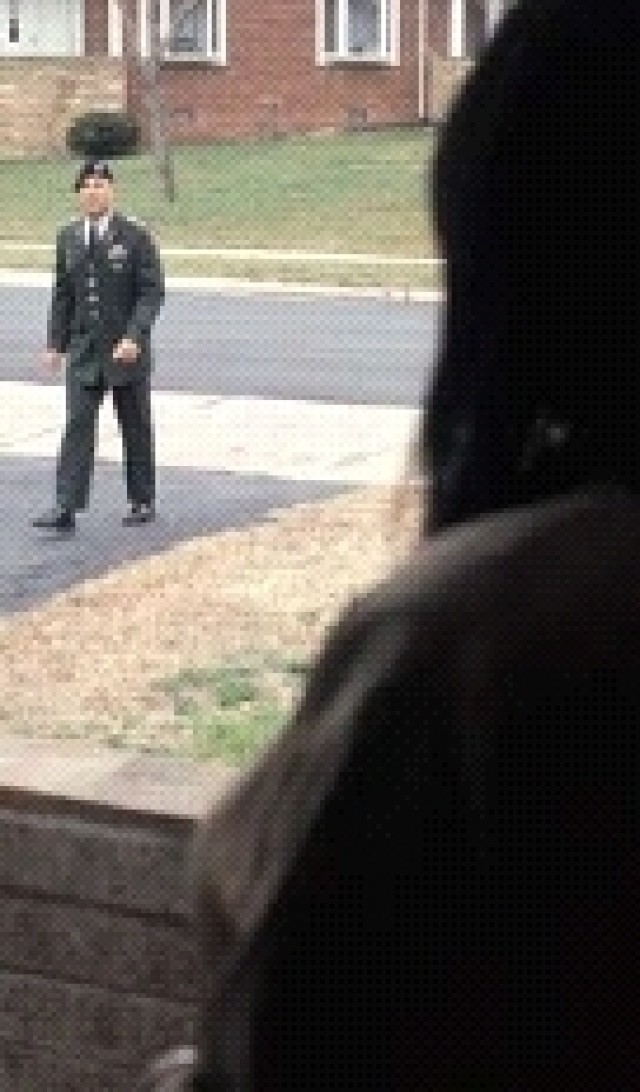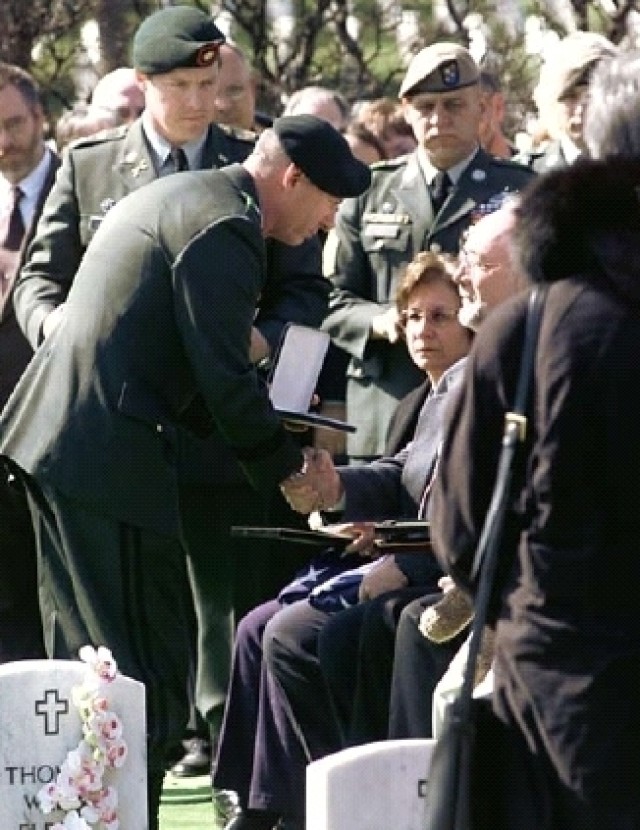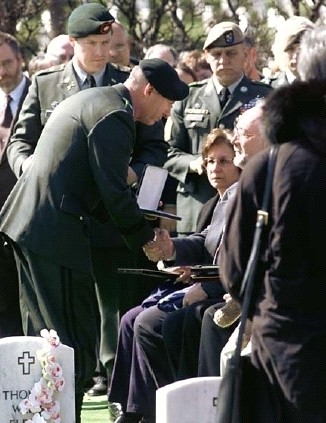Casualty-notification duty is something all Soldiers dread but none neglect to perform with honor, because it's the last thing one Soldier can do for another at a time when the fallen Soldier's survivors need compassion, straight answers and strength more than ever, said Maj. Scott Sanders, an Army officer who recently performed a casualty-notification mission for a 101st Airborne Division Soldier whose family lives near Fort Monmouth, N.J.
As a notification officer, "you'll be judged not only by your military peers, but by the deceased Soldier's loved ones. And although you may never have met the Soldier who died, the fact that he wore a uniform, and so do you, means you're family."
Notification duty officially begins when a Soldier receives a prepared statement and is told to inform some one's parents that their son or daughter has been killed in the line of duty. Sanders got the job when his name came up on a roster.
On his way to the parent's home, he wondered if there was any way to soften the words that would surely be the most devastating these people had ever heard. He began practicing his statement aloud and altered the tone several times, knowing there was no right or wrong way. Nothing was going to change what had happened.
Sanders also contemplated rumor-mill stories that had circulated about other notifications; one family grabbed the notification officer and cried, while another refused to allow the notification officer into their home for several hours.
One father claimed the notification officer was at the wrong address, refusing to believe the casualty was his son.
"Many notifications have been made late at night, as mine was," Sanders said. The Army's concern is that some one other than an Army representative might deliver the news unprofessionally and without accurate information.
The closer Sanders came to the Soldier's home, the more he prayed that no matter how the family reacted, he'd act professionally.
Finding the right house was difficult. And after much futile pounding, a neighbor suggested Sanders try knocking on the back door, since the family entered and exited from there.
As he approached the entrance, Sanders' stomach seemed to fall to his feet, and his whole insides ached. Then the door opened.
Concentrating on the words he was going to say was difficult, he said, as a middle-aged couple looked at him, taken aback by his presence, especially at such a late hour.
Mustering as much courage as he could, Sanders read his prepared statement, as his hands trembled. Etched in his memory forever was a father who simply stared at him, too shocked to do anything else, while the mother pound ed the table with her fists in anger.
On this night, there were two casualty notifications because two Soldiers whose families were from the same area had been killed. Because the CNO and CAO the Soldiers who notifies the family of a death and the Soldier who helps the family following the death notification - cannot be the same person, Sanders had to switch jobs with the Soldier who made the other notification.
That meant Sanders had to face a second family the next day. Knowing what was coming, and the vision of the two distraught parents he just left, made any sleep that night impossible.
The next morning came quickly. As CAO, he commanded himself to be professional when approaching the Soldier's family. He called ahead so they would expect him. But it had been less than 24 hours since the parents learned their son had been killed in Iraq by an improvised explosive device. And there was no way to tell how they were dealing with the reality.
His first visit with the new family centered mostly on helping them com plete necessary paper work; he needed their signatures and Social Security numbers on various forms.
Watching their pain, Sanders struggled to keep his composure. The hardest part was reviewing death-gratuity payments. That's when the dead Soldier's parents broke down, no doubt wondering how anyone could measure their son's life at any price.
Sanders sensed that while all those forms explained "who, what, when and how," what was missing was the "why." Why their son' It was a million-dollar question that he would never be able to answer.
Following Sanders' explanation about how the Soldier died and the requisite form-signing requirements, the parents asked the inevitable ques tion: "When will our son come home'" Sanders didn't have an answer. All he could do was assure them they would be notified the minute the body arrived at the predetermined destination.
Sanders said waiting for that call was nothing short of torturous.
Once the Soldier's body was returned to the family, there was no denying what had happened. Sanders knew that - depending on the circum stances of death - some families had the chance to see and touch their child one last time. They also received the Soldier's personal effects.
Other families had no one to hug and kiss goodbye. No clothing, no letters from home the Soldier might have kept in a special pocket until the next one came, no personal pictures, no Bible that was given before departure, nothing.
Sanders had come to dread leaving the family after each visit because of the tears he automatically shed afterwards. Serving as a CAO had made him realize he wasn't the hardcore Soldier he thought he was.
But Sanders always checked the sorrow by the time he arrived home. He knew that was a must to keep his family from seeing him that way. He knew they, too, had been affected by his latest mission. It reminded them how fragile life really was and how dangerous soldiering can be. If they saw him upset, doubts would surface about why he was in this job in the first place.
Sanders simply pulled himself together and acted like it had been "just another day at the office." But he also hugged his wife a little tighter and indulged his daughter by reading her an extra story at bed time. On a few occasions when sleep refused to come, he rose in the night and watched the peaceful faces sleeping.
During the visitation and funeral, Sanders and his assistants stood rigidly at attention or parade rest while watching the visibly shaken family and other mourners. He found himself wanting to cry with them.
"Standing alongside the other Soldiers who were part of the honor-guard detail and pall bearers was somewhat comforting," said Sanders. "With them, I felt a sense of pride. It was obvious they'd spent a great many hours on caring for their uniforms, to ensure they were meticulous, as were their polished drill-and-ceremony skills. It all translated into a dedicated brotherhood. That's how Soldiers honor their own."
There was a great deal of saluting, but it's the long, drawn-out one at the final resting place that made Sanders understand the last goodbye was here.
As Sanders' hand came up for that slow, extended salute reserved for fallen Soldiers, he realized how well he had come to know him through his family and friends and through the stories and pictures they had shared. It was in that sanctified moment Sanders relived the slain Soldier's life and realized how much they had in common.
Like Sanders, he had loved his country and believed in its values. They had both sought to accomplish challenges that afforded self worth and confidence and instilled the desire to reach even higher goals. Best of all was the bonding with other Soldiers along the way that made them all closer than family.




Social Sharing